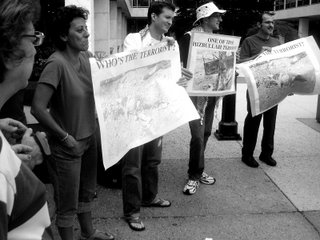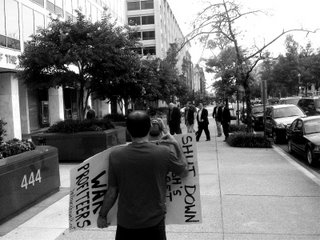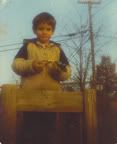Fortunately, there is quite an anti-authoritarian thread running through the Dharma. The historical Buddha (a regular guy who actually lived, and actually died - from eating bad pork, no less - just like you or I) seems to have given a number of sermons in which he challenged his listeners and monks not to adopt any belief or any practice merely at his recommendation. An individual's ability to empirically weigh evidence and directly experience any given "truth" was integral to the tradition, pretty much from the get-go. The Buddha often referred to the Dharma as a raft; a raft serving the exclusive function of getting one from one side of a river to the other. If said raft does not adequately serve that purpose, it should be abandoned. It's no different for the Dharma. On his deathbed, the Buddha refused to appoint a successor, and encouraged his followers to be "a light unto [themselves]."
In that spirit, I've been grappling some, as of late, with what taking refuge in the Sangha means (for me). The Sangha refered (initially) to the community of monks and nuns in a given community; taking refuge therein presumably meant seeking spiritual guidance, empathy, compassion, etc. from engaged community (in the form of a monastic order). Clearly, the laity has taken some creative license with that over the years, and rightly so. As one columnist noted in the latest issue of Tricycle (in a column challenging the Dharma's default to monogamy in sexual relationships), it makes little sense for any of us to be heeding sexual prescriptions from monastic adherents whose sexual experience is limited or non-existent (at best).
But it doesn't really change that there is something to the notion that great insights, growth, challenge, and comfort are to be found in community. There is something to be said for what we earn from humbling ourselves in the presence of those we trust, and accepting that we may not know exactly what to do, or how to resolve this or that; accepting that we're desperate, fallible... even mortal. Or maybe just that the world is bigger than any one of us. There's something to that.
The attacks on Lebanon have been an internal nightmare for me. When I came back from the West Bank three years ago, I staggered in the helplessness that consumed me during my stay for some months. And it wasn't really something I could even describe, much less talk about, with friends. A few of my Palestinian friends were acquainted enough with the trajectory one observes in the Territories that I could kinda exhale in conversations with them, but something about that felt inappropriate at times; given their own trauma, their own families, etc. what obligation did they have to burden themselves with this white boy's realization that history had swallowed him and everything that (up to his arrival in Tel Aviv) had kept him hopeful?
Edward Said's 1993 Reith Lectures on the BBC provide an unlikely analogy for the mechanisms by which I've perhaps coped with the knowledge I cannot undo:
The exile... exists in a median state, neither completely at one with the new setting, nor fully disemcumbered of the old, beset with half-involvements and half-detachments, nostalgic and sentimental on one level, an adept mimic or a secret outcast on another.
It seems quite clear that a mere example (The Buddha) and a personal practice (The Dharma) are, on their own, woefully inadequate in the face of exile - be that exile literal, or manifest in finding oneself permanently cut off from the stability of one's assumptions and/or naivete. Going it alone (regardless of examples or practices) is woefully inadequate when it's quite possible there are no answers, no solutions (to speak nothing of easy answers). Right now, some half a million people are internally displaced in Lebanon. Hundreds are already dead. And the weapons that made it all possible were financed, manufactured, and provided on my dime. Sure, we've all acknowledged that, in the abstract. It's another sport entirely to know exactly what that looks like, and exactly what it means when the US Ambassador to the UN goes on record with the same colonialist, apartheid logic that animated virtually every Israeli you ever met; the logic that crushed you, silenced you, and terrified you every time you encountered it three years ago.
So... Rami, Zein, Noura, Jake, Jamilah, Jeff, Mark, Ehmad, Matt, Mary Kate...Thanks for allowing me some refuge in being able to struggle alongside you. And to Hugh, thanks for having the heart to speak of struggling with the "unconscionable", and giving that space in your practice alongside the immanent struggles of your loved ones.
Between waking and finding my way to meditation in Woodley Park this morning, I found my way to the west side of Capitol Hill, hoping to greet John Bolton before his appearance on Fox News, to confront him for stopping just shy of publicly declaring that brown bodies don't matter. We didn't meet, but the voices of a handful of sane people reverberated off the facade of the Fox News building during his visit. Stay tuned.



For those interested, Anthony Shadid's reporting (in The Washington Post) from Lebanon has been a real bright spot in mainstream news coverage. His most recent pieces are below.
No Haven in a City Paralyzed by Dread
Residents of Besieged City Feel 'Just Left Here to Die'
TYRE, Lebanon, July 20 -- The warning came...
Road Through a Landscape of Death
I also highly recommend bookmarking, and keeping up with Electronic Lebanon.

No comments:
Post a Comment